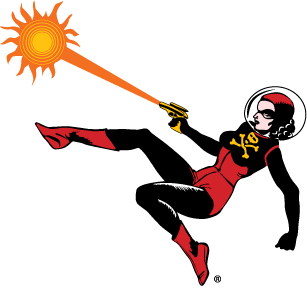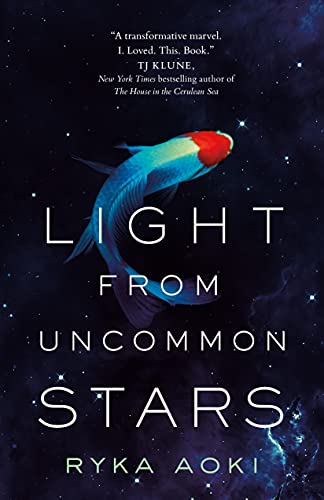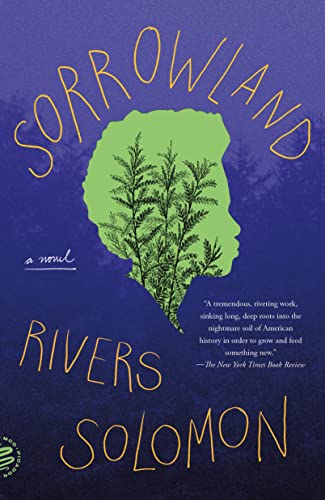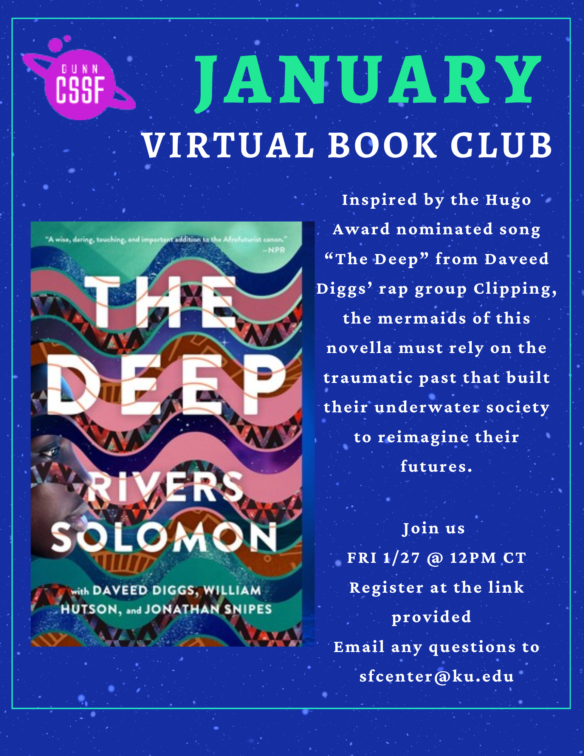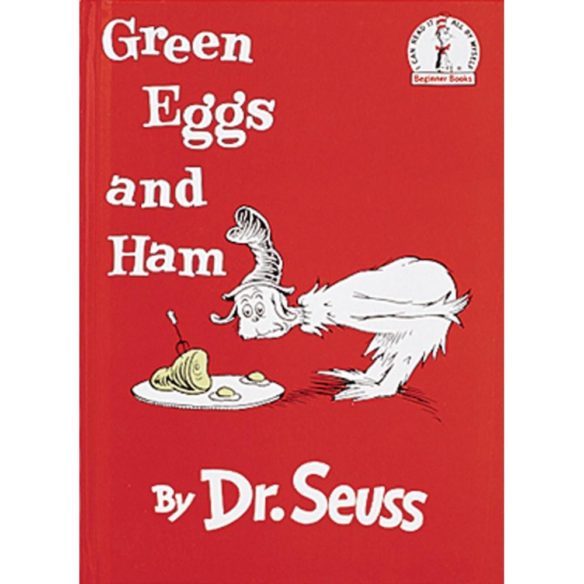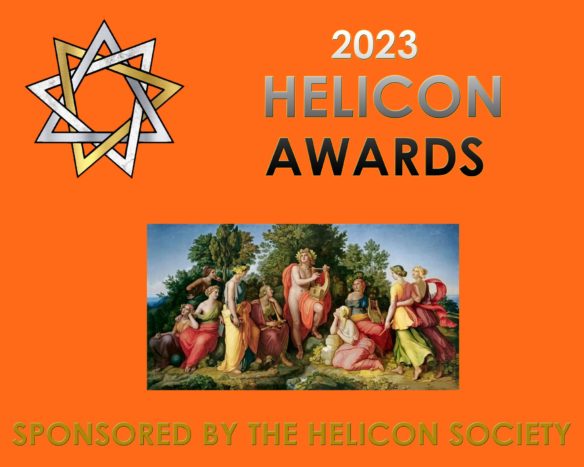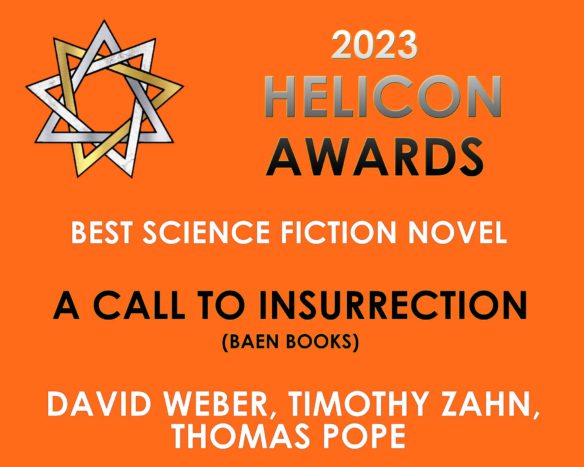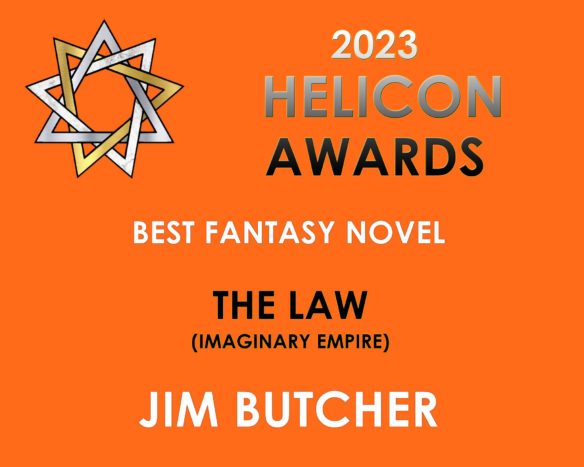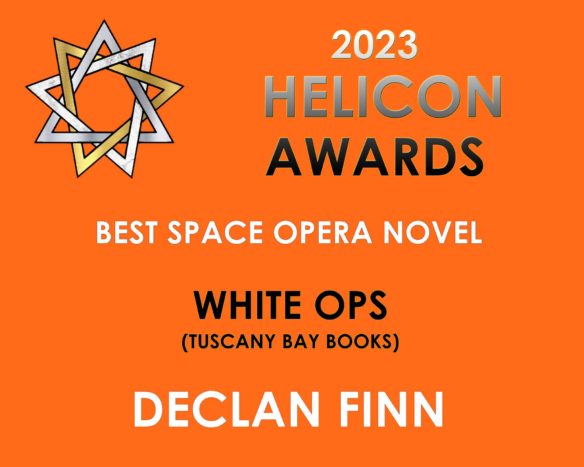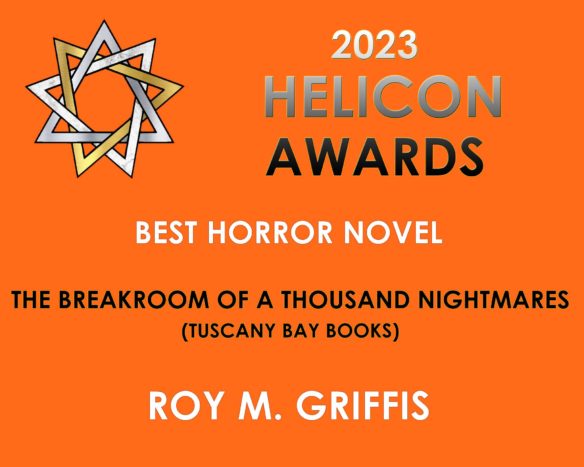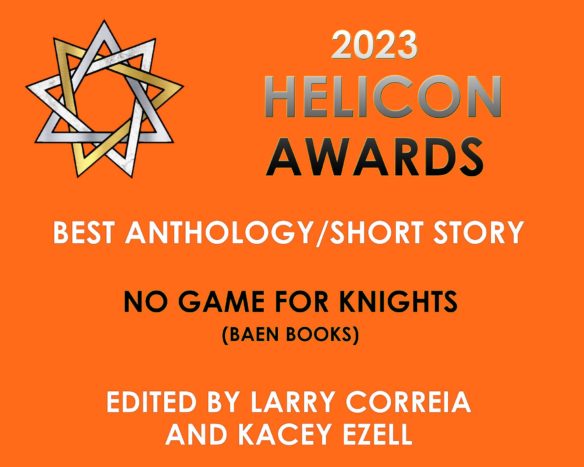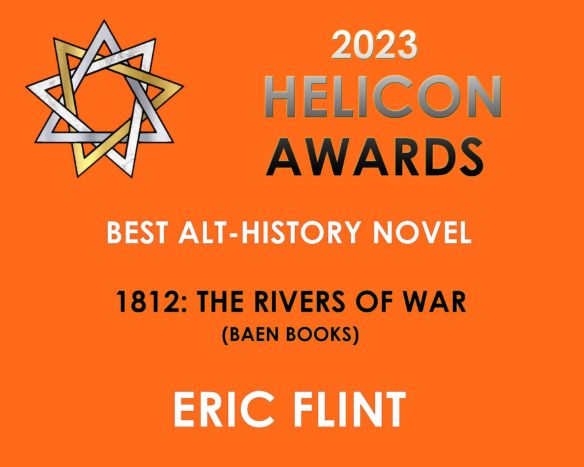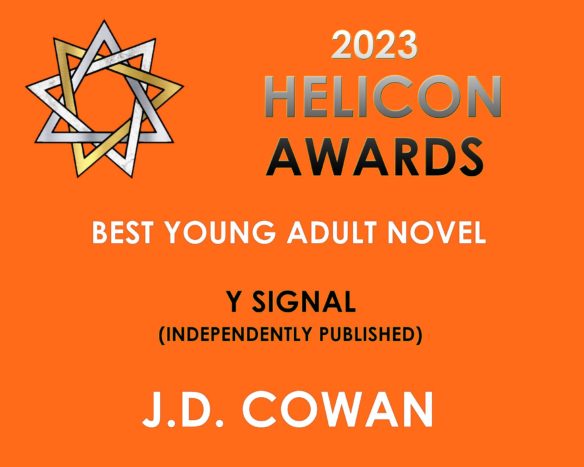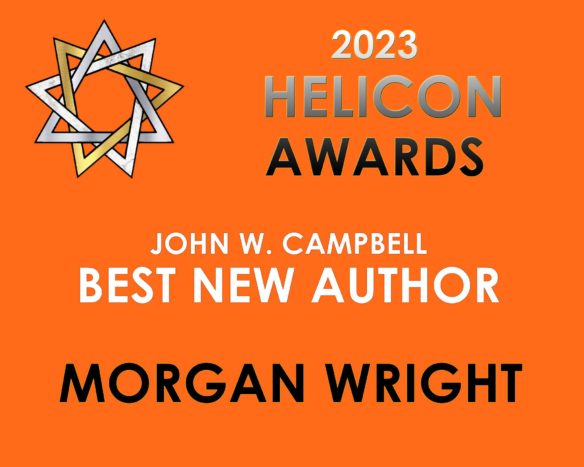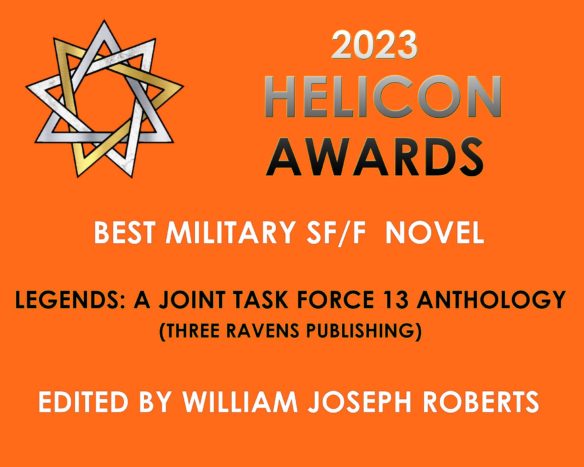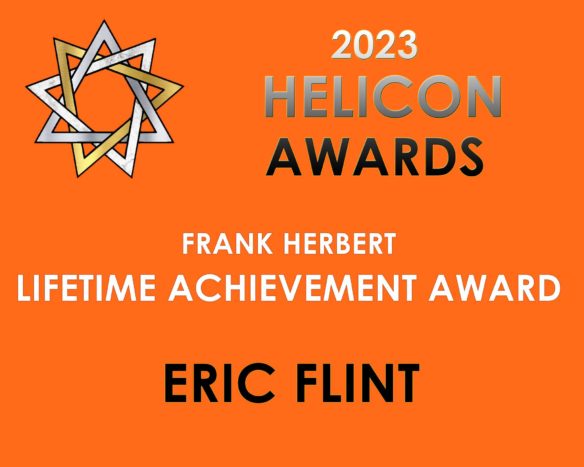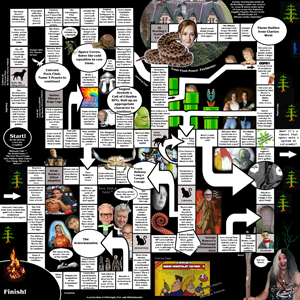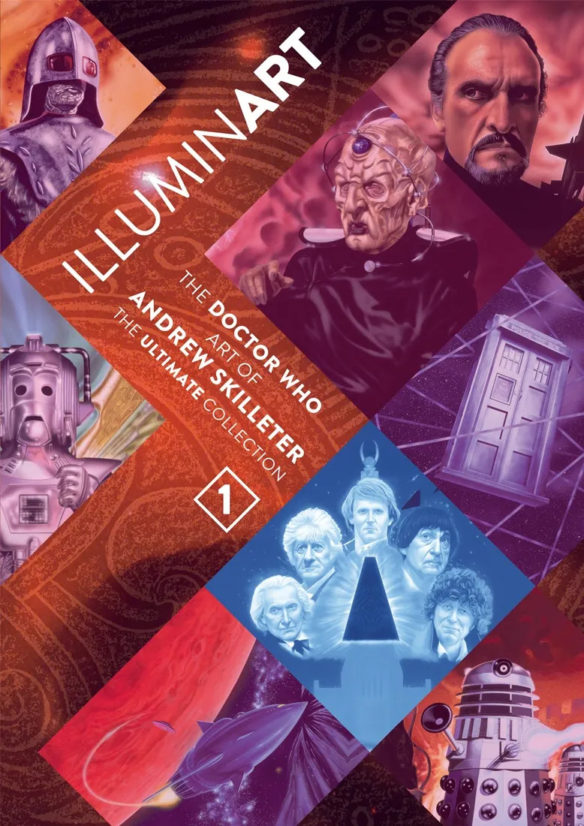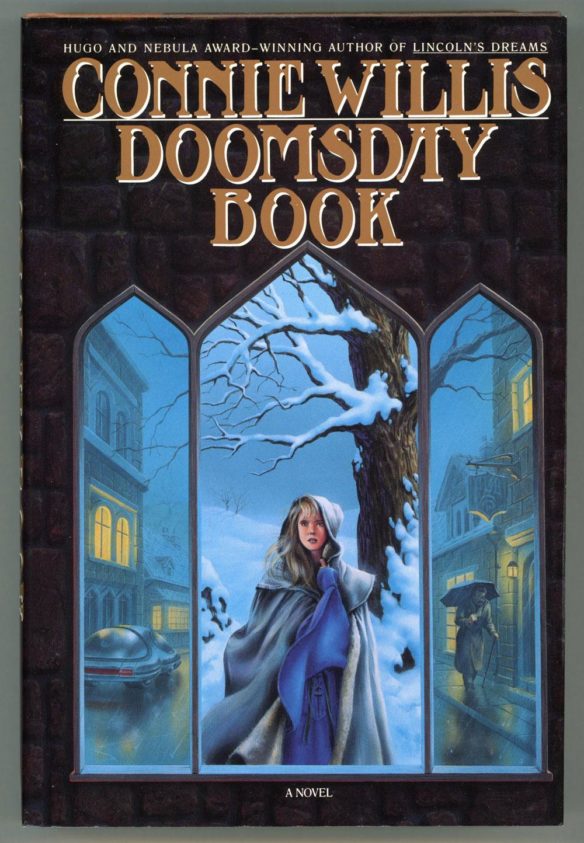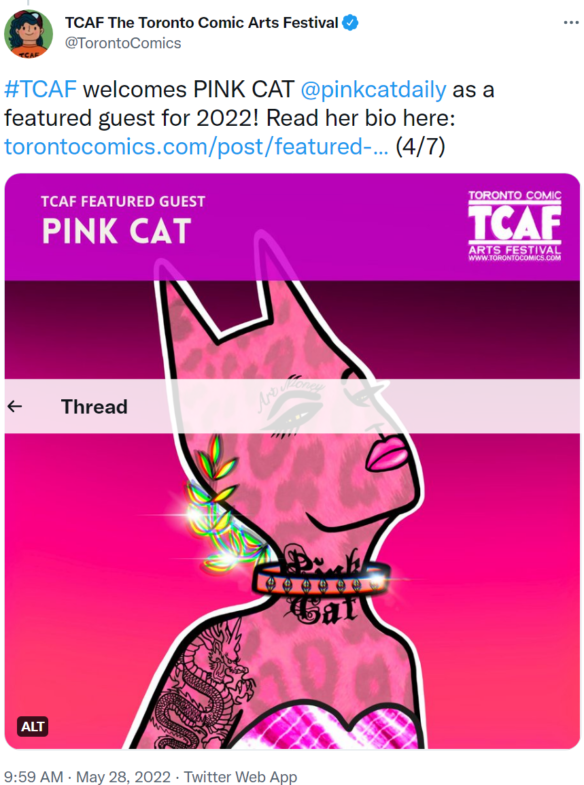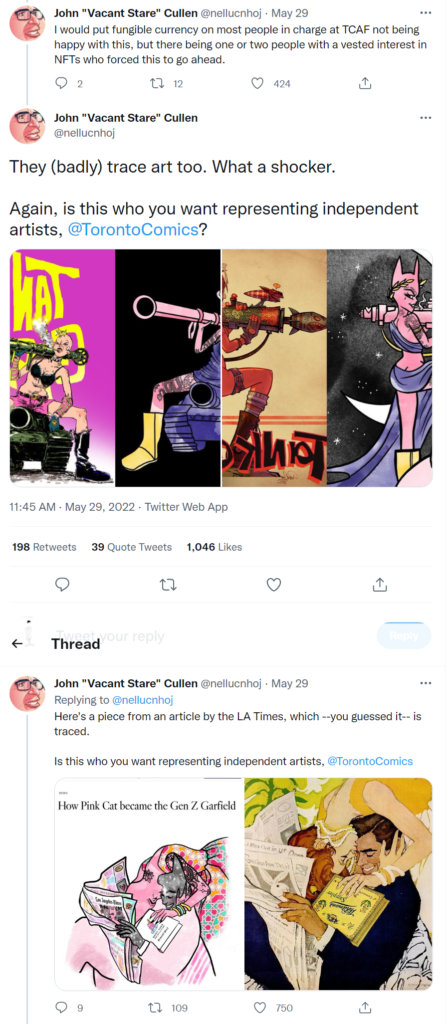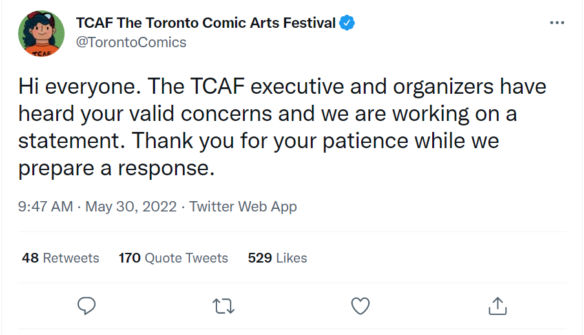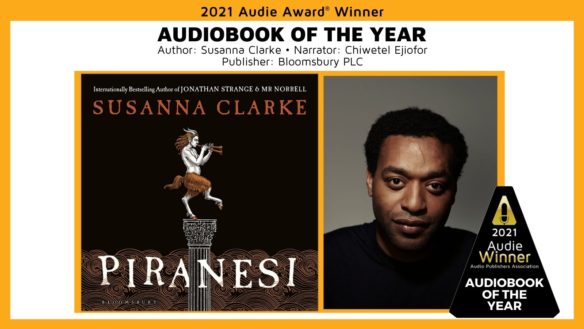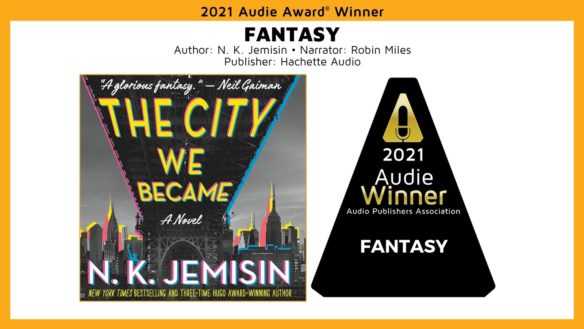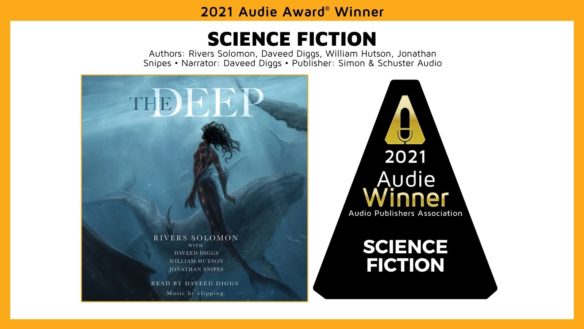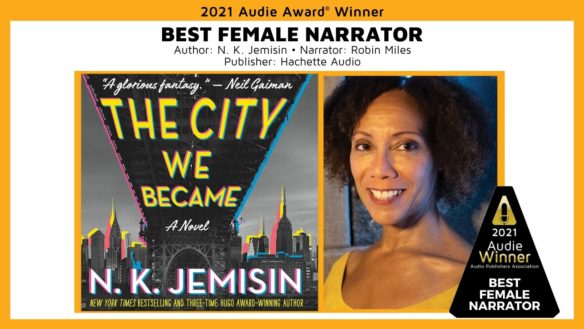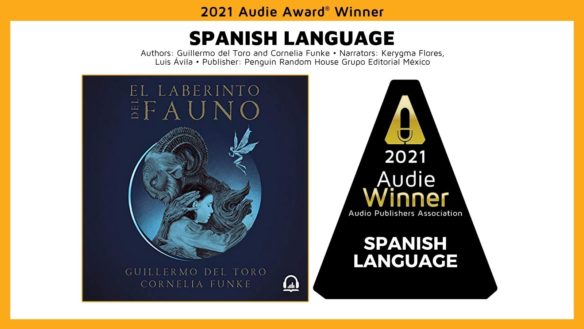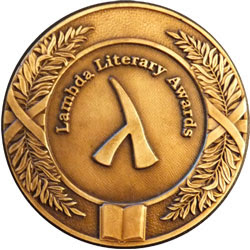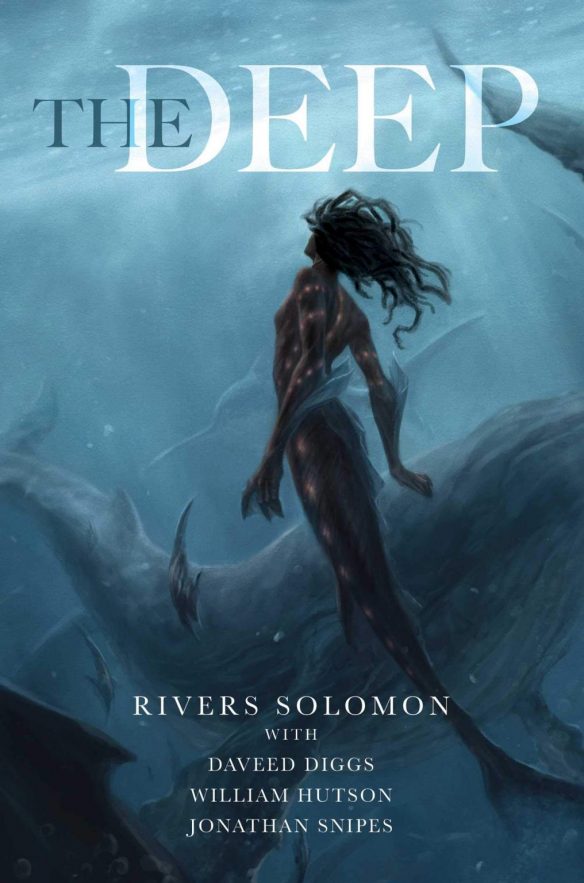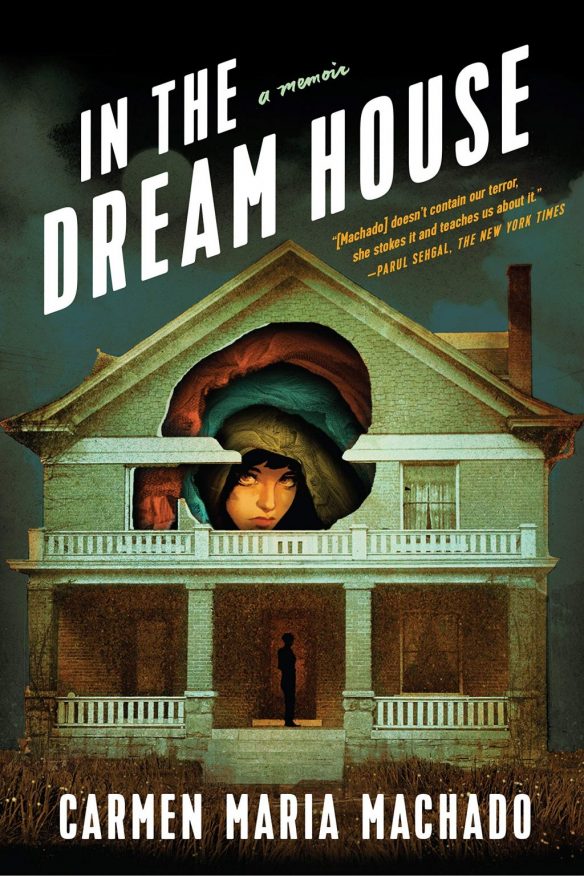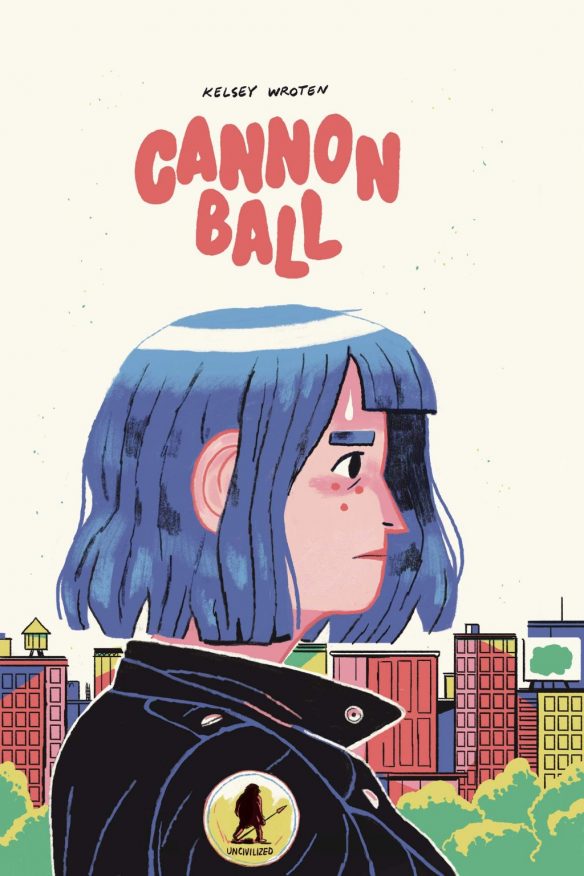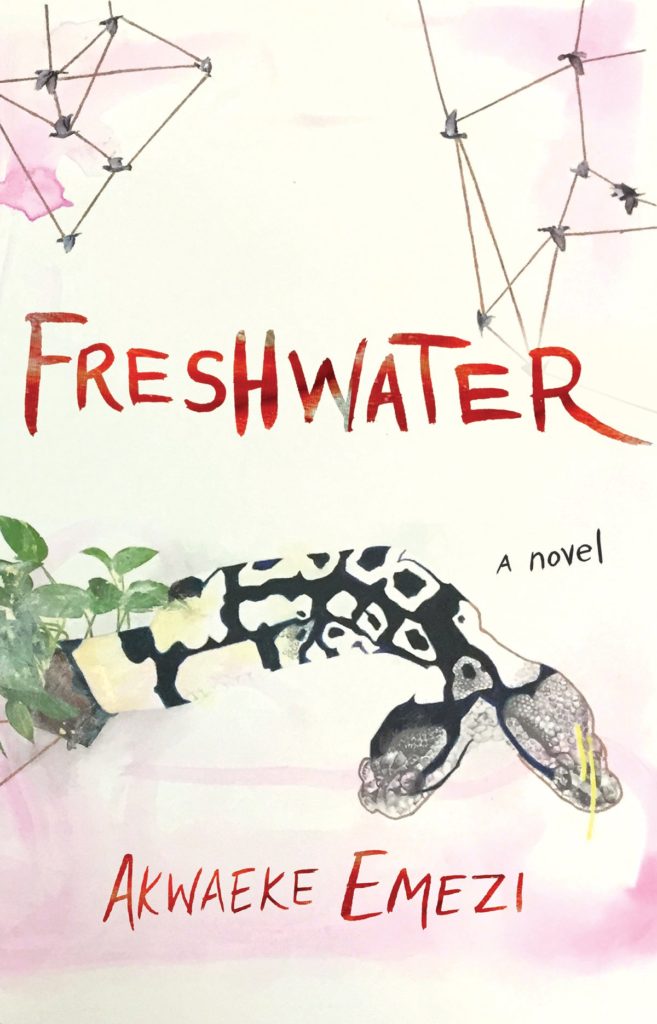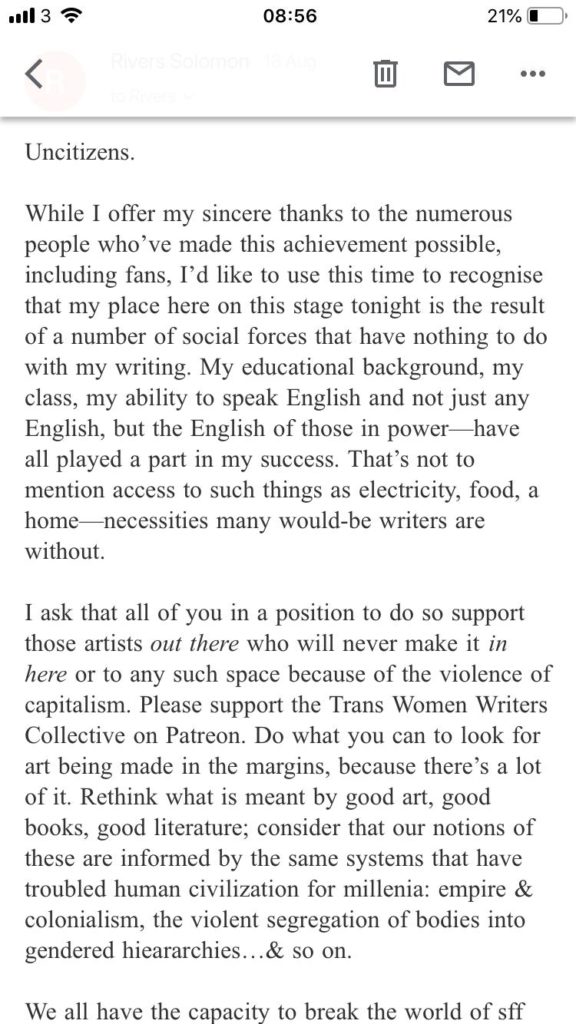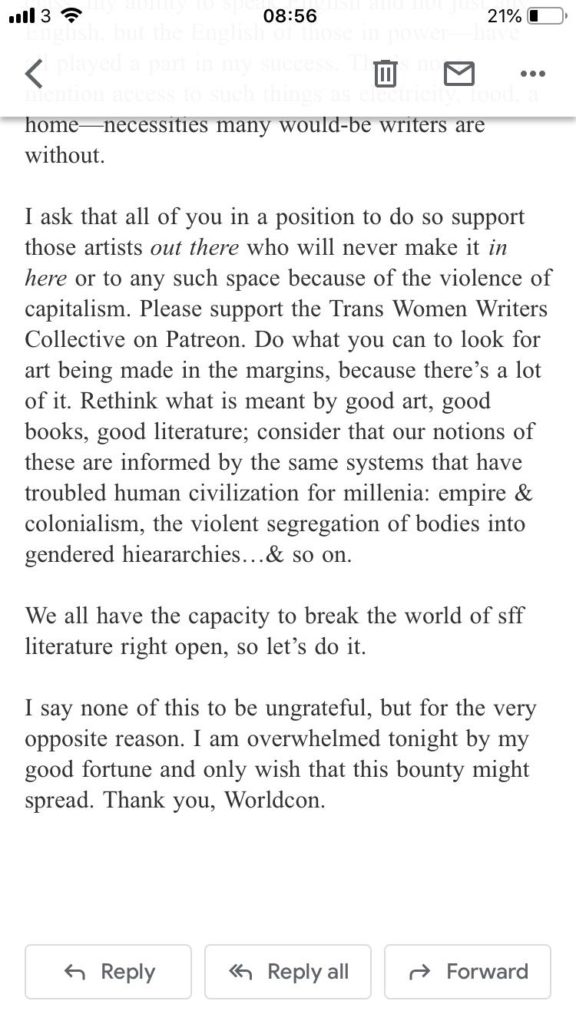(1) GROOT, STAR-LORD, ROCKET, OR WHO? Guardians of the Galaxy stars Karen Gillan and Pom Klementieff test their knowledge of Volumes I and II by seeing if they remember who said what lines.
With such a stacked cast, the challenge should be difficult, but having such iconic characters like Groot played by Vin Diesel, Starlord by Chris Pratt, and Bradley Cooper as Rocket, Mantis and Nebula’s knowledge proves to be superior. Get ready for Vol III of ‘Guardians of The Galaxy’ by time-traveling through lines of volumes past.
(2) WISCON SPEECHES. The WisCon 46 GOH speeches and Otherwise Award presentation can be viewed on YouTube.
(3) NEXT YEAR IN NEW MEXICO. And WisCon GoH Martha Wells has been announced as Guest of Honor of the 47th Jack Williamson Lectureship which will take place April 11-13, 2024.
Best known for her Murderbot Diaries, Martha Wells has been an actively publishing author in scifi and fantasy since 1993 and in that time she has won four Hugo Awards, two Nebula Awards and three Locus Awards. The Murderbot Diaries is also currently being adapted for a TV series, and this series has been growing increasingly popular in the past few years.
(4) GOOD OMENS GRAPHIC NOVEL. The second season of the TV series arrives July 28, and now a Good Omens graphic novel has been announced – Comics Worth Reading has the story. Neil Gaiman, the Terry Pratchett Estate, and Colleen Doran are creating a graphic novel version of Good Omens that will be funded via Kickstarter. The Kickstarter has not yet launched, but you can sign up at the link to be notified when it does.
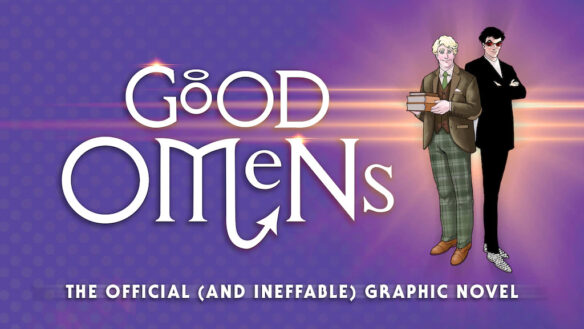
(5) SIGNED, SEALED, AND SOON TO BE DELIVERED. Guess where fans will be able to find the new Sharon Lee and Steve Miller book?
(6) NOT JUST A GOOD IDEA, IT’S THE LAW. James Davis Nicoll brings us “Five Ways SF Writers Sidestep the Problem of Relativity” at Tor.com.
Relativity! Extremely well supported by the evidence, and extremely inconvenient for SF authors who want jaunts to the galactic core to be as easy as popping down the road. Given a universe so large that light takes as long as anatomically modern humans have existed to meander across a single galaxy, combined with a very strict speed limit of C, and you face a cosmic reality that makes many stories authors might want to write quite simply physically impossible. So… what are hardworking science fiction authors to do?
The first solution, courtesy of E. E. “Doc” Smith is —
Disregard the Issue
By far, the most popular option is to ignore the issue or actively deny that it is an issue. Maybe Einstein divided when he should have multiplied (he didn’t). Perhaps light speed can be surpassed given sufficient will (it can’t). What if some miracle material for which absolutely no evidence exists could facilitate superluminal travel? (More likely, such materials are simply non-existent.)
(7) THOUGHT EXPERIMENT. SYFY Wire reveals “The Real Reason Kong Is Alone: The Science Behind King Kong”. For some values of science…
…The particulars of Kong, including his size and origin, vary from movie to movie, but in every single telling he is alone. The reasons for his solitude haven’t been widely explored, but the 2005 movie shows the decaying skeletons of other giant apes, long since dead. While their cause of death isn’t entirely clear, it’s implied that the rest of Kong’s family were killed off by the other large predators on the island, particularly the T. rex-like theropod dinosaurs.
The dinosaurs probably contributed to the demise of Kong’s species, but the true culprit may have been the island itself. In the continuity of Jackson’s 2005 film, Skull Island was slowly sinking into the ocean by the time Denhem and crew landed on its shores. By 1948, a 9.2 magnitude earthquakes broke it loose and the island vanished into the sea….
(8) AD ASTRA. Chris McKitterick recently announced that Ad Astra (originally established as a University of Kansas Center in AAI) has now grown into the not-for-profit Ad Astra Institute for Science Fiction & the Speculative Imagination.
Led by yours truly and Kij Johnson, Ad Astra is an umbrella organization that brings together creators, readers, educators, and fans to learn about and create speculative fiction through writing workshops, expert talks, seminars, and more. The people we work with create and teach art that opens minds and imaginations, reaching for the stars and “Saving the world through science fiction!”
Their residential Science Fiction Summer program takes off in mid-June, in-person again for the first time since before Covid. Kij Johnson and Barbara Webb’s Novel Architects Workshop is now full, but there’s still room in McKitterick’s Speculative Fiction Writing Workshop (and both of his and Johnson’s “Repeat Offenders” workshops).
Also, a talk-and-weekend-workshop “Science into Fiction” Spec-Fic Writing Workshop series resumes in late August.
(9) HOWARD DAYS. Brian Murphy reports on the annual Robert E. Howard gathering to readers of The Silver Key: “There and back again from Massachusetts to Cross Plains: A recap of 2023 Robert E. Howard Days”.
…I live in Massachusetts, some 1600 miles from the small town in West Texas that Howard called home. With a wife and family, domestic obligations, and a busy professional career to manage, there is never a good time to do something like this, even though Howard Days had been on my bucket list for years….
The annual con is also part pilgrimage:
…Nothing can quite prepare you for the first view of Robert E. Howard’s home and ultimately the humble bedroom where did the majority of his writing. Others have made the same observation many times, but its stunning that Howard was able to birth and deliver such vivid creations to the world from such small, prosaic quarters. It’s a testament to his unique genius. The volunteer docents who serve as tour guides, women from the Cross Plains community, were patient and wonderful. I learned that Howard’s father, Isaac, treated bloodied oil field workers right in the Howard home. One docent noted poetically that blood has seeped its way into the roots of the home….
Murphy is also one of the guests on the Rogues in the House podcast episode “Howard Days Wrap Up”.
(10) ATOMIC SHAKESPEARE. Eighties cult TV favorite Moonlighting reportedly is slouching its way towards availability on a streaming service. Meantime, Heritage Auctions will put on the block some of the costumes from its most iconic episode, as explained in “Maddie, David and Bill Shakespeare”.
…That episode essentially paid tribute to [showrunner Glen] Caron’s inspiration for the entire series: The Taming of the Shrew. Willis, of course, would play the fortune-seeking Petruchio; Shepherd, the titular “shrew,” Katherina. The rest of the regulars rounded out the cast, among them Allyce Beasley and Revenge of the Nerds’ Curtis Armstrong, which was transported from the Blue Moon Detective Agency in Los Angeles to Padua, Italy, in 1593 (“or just an incredible facsimile,” per the title card, which was the Universal backlot).
The episode starts as a Moonlighting episode about a kid wanting to watch a Moonlighting episode; no series winked at itself in the funhouse mirror more. But the boy’s mother banishes him to his room to do his homework – in this case, read Shakespeare. He cracks open the play, and the episode quickly morphs into a rather sincere retelling of The Taming of the Shrew, down to the iambic pentameter and its occasional use of actual dialogue, combined with some anachronistic winks (Willis’ Ray-Bans, his saddle bearing the BMW insignia, the performance of The Rascals’ “Good Lovin’”)….
(11) GEORGE MAHARIS (1928-2023). Actor George Maharis, best known for his work on TV’s Route 66, died May 24. Though it was not a genre program, Steve Vertlieb recalled in his File 770 post about Route 66 there was one episode with a strong genre appeal to horror fans:
…“Lizard’s Leg and Owlet’s Wing” premiered over the CBS television Network on Friday evening, October 26th, 1962. Featuring guest stars Boris Karloff, Peter Lorre, and Lon Chaney, Jr., this beloved episode of the classic television series “Route 66” starring George Maharis and Martin Milner would be the last time that Boris Karloff and Lon Chaney, Jr. would ever reprise their signature performances as Frankenstein’s Monster and The Wolf Man….
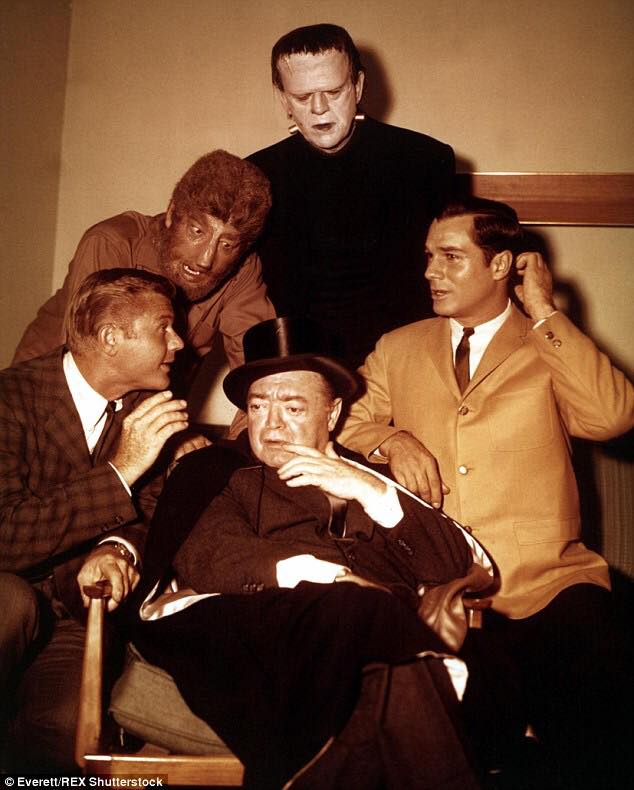
Deadline’s summary of his career includes these appearances on genre shows:
In the 1970’s, Maharis returned to television and starred in shows like Night Gallery, The Mostly Deadly Game, … Mission: Impossible, … The Bionic Woman, Fantasy Island, and many more.
Maharis’ final credit was in the film Doppelganger directed by Avi Neshar in 1993 which starred Drew Barrymore and George Newbern.
(12) MEMORY LANE.
2011 – [Written by Cat Eldridge from a choice by Mike Glyer.]
Sheri Holman’s Witches on the Road Tonight is the source of our Beginning this Scroll.
It was published twelve years ago by Atlantic Monthly Press. It would win a Shirley Jackson Award for Best Novel, and it also won the Independent Publisher Book Award, Gold Medal, Literary Fiction. It was named a Book of the Year by the Boston Globe, the Toronto Globe and Mail, and PopMatters. Very impressive I’d say.
It is her only genre novel to date. She has written several other novels including a mystery set in a medieval monastery. Oh, and she was a principal writer on the Longmire series for much of its run.
(I finished watching the Longmire series recently. They did a stellar job of tying everything up there.)
And now the Beginning…
Eddie
New York City
Midnight
Of all the props I saved, only the coffin remains. Packed in boxes or tossed in the closet were the skulls and rubber rats, the cape folded with the care of a fallen American flag, my black spandex unitard, white at the seams where I’d stretched out the armpits, sweat-stained and pilled. I saved the squeezed-out tubes of greasepaint, the black shadow for under the eyes, the porcelain fangs. Of the gifts fans sent, I kept that bleached arc of a cat’s skeleton, the one you used to call Fluffy and hang your necklaces from, and a dead bird preserved with antifreeze. I kept maybe a hundred of the many thousands of drawings and letters from preteen boys and girls. There were some from adults, too, confessions of the sort they should be writing their shrinks or the police, and not a man who plays a vampire on TV. “Dear Captain Casket, Fangs for the memories.”
But in the move up to Manhattan, in the successive apartments Charles and I shared, everything has been lost or thrown away. Coming to me late in life, Charles has been pitiless in tossing my prehistory, usually while I am off at one of the twice-yearly conventions I attend as if having an affair we both tacitly refuse to discuss. Now everything has been scrapped but the coffin, too big not to be missed, too great a conversation piece even for Charles, a bit of memorabilia that you might send off to a regional horror movie museum or sell to some theme restaurant as the base of a fixin’s bar to defray a small portion of the funeral cost. We’ve been using it as a coffee table, pushed in front of the big picture window that overlooks the Chrysler Building, a view that accounts for three-quarters of the ridiculous price we paid for this apartment. It has held up well over the years, made of wormy chestnut, hand-planed and smooth as a wooden Indian. I used to keep it in the carport between Saturday shows, and you played in it as a girl. Sometimes when we couldn’t find you, your mother and I would look outside and you’d be curled up inside it, asleep, your hand bookmarking the eternally youthful and nosy Nancy Drew, your mouth brushed with cookie crumbs.
I have made it as comfortable as possible. It is lined with an old down comforter tucked inside one of Charles’s more elegant duvet covers, a dusky rose shot with gold thread. I have a pillow for my head and a scarlet throw to keep me warm. You might think I’d like to go out in full costume, but camp comes too easily these days. I’m wearing, instead, my most comfortable pajamas, the ones with the pug dogs you bought me for my birthday last year. They are about the only ones my chemo-blistered skin can bear. Before I put them on, I took a shower and washed what’s left of my hair. Maybe it was cowardly to wait to do this until Charles was out of town. His mother, who is only a few years older than I, is ill, too, and poor Charles hasn’t known whom to nurse more dutifully. He refuses to discuss my death, pulling, instead, all sorts of prophylactic voodoo like purchasing cruise tickets for next spring, or placing a down payment on a purebred mastiff puppy, if you can imagine, as if he can mortgage me back to life, keeping me on the ventilator of increasingly onerous financial obligation. I know he will be furious when he gets back from Philadelphia, but maybe he’ll take his mother with him on that cruise through the Cyclades.
My only real regret is not seeing you one last time. I left you a message before you went on the air, something light and innocuous, and I hope you’re not too shocked to hear it after you get the news. I want this good-bye to set the tone for all the memories that follow it. When people approach me about my show, they never want to talk about the cut-rate monster movies. Most can barely remember the titles. No, it is the irreverence of the interruption they cherish, the silliness and explosions. I made it my career for decades, but only now do I begin to understand the need to terrify, followed by the even greater need to puncture the fear we’ve called into being. It is a surrender and recovery that feels suspiciously like love.
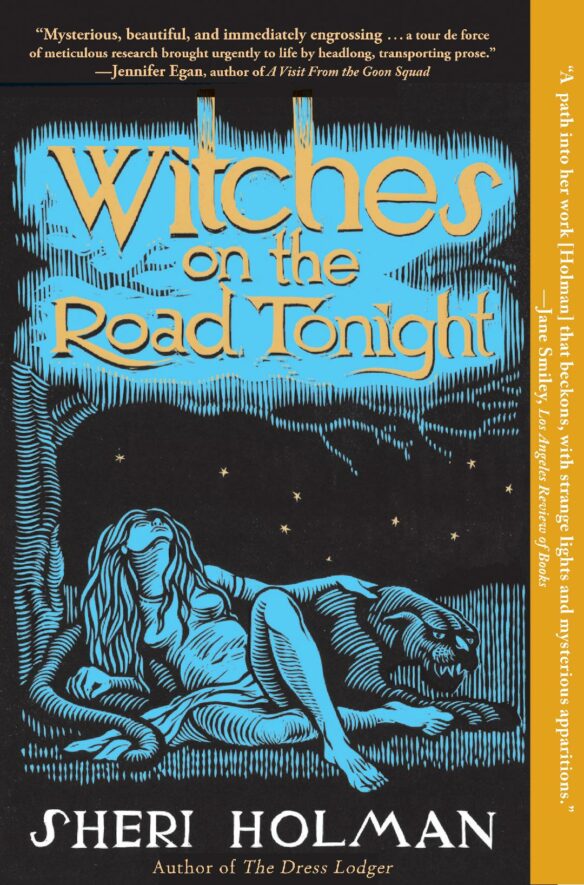
(13) TODAY’S BIRTHDAYS.
[Compiled by Cat Eldridge.]
- Born May 29, 1906 — T. H. White. Best known obviously for the wonderful The Once and Future King which I read a long, long time ago. Back in the Thirties, he wrote Earth Stopped and its sequel Gone to Ground, sf novels. Gone to Ground contains several fantasy stories which were later reprinted in The Maharajah and Other Stories. ISFDB also lists Mistress Masham’s Repose, The Elephant and the Kangaroo and The Master as the other novels by him, plus the aforementioned story collection. (Died 1964.)
- Born May 29, 1909 — Neil R. Jones. It is thought that “The Death’s Head Meteor,” his first story, which was published in Air Wonder Stories in 1930, could be the first use of “astronaut” in fiction. He also created the use of a future history before either Robert A. Heinlein or Cordwainer Smith were to do so. They’re collected in The Planet of the Double Sun, The Sunless World and a number of other overlapping collections. He’s a member of the First Fandom Hall of Fame. (Died 1988.)
- Born May 29, 1923 — Genevieve Linebarger. Widow of Cordwainer Smith. She had a hand in The Instrumentality of Mankind series, co-authoring “The Lady Who Sailed the Soul” (1960), and “Golden the Ship Was — Oh! Oh! Oh!” (1959) and, after her husband’s death, was the sole author of “Down to a Sunless Sea” (1975) published under his name, and completed “Himself in Anachron” (published 1993). (Credits per NESFA Press’ Rediscovery of Man collection.) (Died 1981.)
- Born May 29, 1930 — Richard Clifton-Dey. An Illustrator of many SF book covers including The Wizard of Venus by Edgar Rice Burroughs. He did not sign many of his originals so his widow has the final say what is an original and what is not. (Died 1997.)
- Born May 29, 1939 — Alice K. Turner. Playboy fiction editor from 1980 to 2000. Silverberg praised her highly and she did much to make sure SF had an important place in the fiction offered up there. The Playboy Book of Science Fiction collects a good tasting of the SF published during her tenure. (Died 2015.)
- Born May 29, 1952 — Louise Cooper. She wrote more than eight works of fantasy and was best known for her Time Master trilogy. Most of her writing was in the YA market including the Sea Horses quartet and the Mirror, Mirror trilogy. (Died 2009.)
- Born May 29, 1996 — R. F. Kuang, 27. She’s an award-winning Chinese-American fantasy writer. The Poppy War series, so-called grimdark fantasy, consists of The Poppy War which won the Compton Crook Award for Best First Novel, The Dragon Republic and The Burning God. She’s been a finalist for the Astounding Award for Best New Writer.
(14) COMICS SECTION.
- Candorville shows a new tech that combines streaming with nagging.
- Non Sequitur looks for a definition of intelligent life.
- Macanudo has a strange mashup of Darth Vader and Casablanca.
(15) ALL IT’S CRACKED UP TO BE. This is impressive – watch Boston Dynamics’ “Spot” deftly remove a pistachio from its shell.
(16) FACTORY SECONDS. Discover Magazine chronicles “Why 1 Second Is 1 Second”.
…Today, however, when computers perform operations at the rate of 4 billion cycles per second, we need a better measure. The rotation of Earth, and its orbit, change slightly over time. Earth’s rotation, for example, is slowing slightly. So measuring a second based on rotation would mean that a second would get slowly longer over time. Ultimately, we couldn’t compare the second of today to the second of yesterday.
So, to pin down a truly timeless measure of a second, scientists in the 1950s devised a better clock, one based not on astronomical processes but on the movement of fundamental bits of matter — atoms — whose subtle vibrations are, for all intents and purposes, locked in for eternity. Today, one second is defined as “9,192,631,770 periods of the radiation corresponding to the transition between the two hyperfine levels of the ground state of the cesium 133 atom”.
That’s a mouthful.
…When hit with a laser, the single electron in a cesium atom’s outermost shell will cycle back and forth between two states — known as a hyperfine transition. It can be magnetically aligned either in the same direction as the atom’s nucleus, or the opposite direction, and under a laser’s beam, it will flip back and forth between these two states rapidly at a rate that never changes. Cesium isn’t the only element for the job, but it has only one stable isotope, so it’s easier to purify, and the hyperfine transition is both large enough and fast enough to be accurate, unlike some other atoms….
(17) NEANDERTHAL CHESS ODDS? According to Discover Magazine, “Neanderthal Brains: Bigger, Not Necessarily Better”. But once you’ve clicked they admit they don’t really know.
Neanderthals had bigger brains than people today.
In any textbook on human evolution, you’ll find that fact, often accompanied by measurements of endocranial volume, the space inside a skull. On average, this value is about 1410 cm3 (~6 cups) for Neanderthals and 1350 cm3 (5.7 cups) for recent humans.
So does that quarter-cup of brain matter, matter? Were Neanderthals smarter than our kind?
While brain size is important, cognitive abilities are influenced by numerous factors including body size, neuron density and how particular brain regions are enlarged and connected. Some of these variables are unknowable for Neanderthals, as we only have their cranial bones and not their brains. But anthropologists have made the most of these hollow skulls, to learn what they can about the Neanderthal mind….
(18) NEXT GEN NAVIGATION. [Item by Mike Kennedy.] A quantum inertial navigation system has the potential to improve INS accuracy to the point that it could replace satellite systems like GPS for some applications. “Imperial College working with Royal Navy on groundbreaking system to replace GPS on ships” explains the Telegraph.
A new quantum compass that could replace GPS on ships has been tested on water for the first time, The Telegraph can reveal.
Inside an old shipping container onboard XV Patrick Blackett, the Royal Navy’s experimental ship, could be the future of navigation.
Military chiefs have been warning for years of the dangers of relying on GPS, due to the potential for adversaries to jam and manipulate trackers.
In an interview with The Telegraph last year, Admiral Sir Tony Radakin, the head of the Armed Forces, warned Russia could wage war in space against the West.
He said: “Russia could also attack the GPS systems which play a key role, both military and civilian, throughout the world,” he said. He added that attacking a nation’s GPS was attractive to an adversary because it involves “neither direct casualties nor an attack on another country’s territory,” and is therefore less likely to provoke a direct Western military response….
(19) VIDEO OF THE DAY. How It Should Have Ended knows “How The Little Mermaid Should Have Ended” and asks for three minutes to tell you.
[Thanks to SF Concatenation’s Jonathan Cowie, Mike Kennedy, Andrew Porter, Dariensync, Cora Buhlert, John King Tarpinian, Chris Barkley, Michael Toman, and Cat Eldridge for some of these stories. Title credit belongs to File 770 contributing editor of the day Nina.]

